C.H. Cobb's Blog, page 26
June 3, 2012
Classic Prayers of Scripture
The most beautiful, powerful prayers are those we find in Scripture, those which are inspired by the Holy Spirit Himself. They contain language and theology that we should imitate in our own prayer lives.
Some are so intimate between persons of the Godhead, such as John 17 (containing the prayer of God the Son to God the Father), that they amount to inter-Trinitarian conversation which we cannot emulate in our own prayer lives, yet do they make for rich meditation.
Some of the classic prayers, such as the cry of dereliction (“My God, my God! Why have you forsaken me?” Matthew 27:46), are so unique in redemptive history that we can not imitate them in our own prayer lives. There are other prayers in which the individual expresses the sense of abandonment (such as Psalm 88) that are more appropriate for you and I.
Some of the prayers noted here preserve none of the original language; merely the fact of the prayer is noted in the midst of the circumstance. Nehemiah’s prayer (Nehemiah 2:4), which comes when king Artaxerxes puts him on the spot, is a classic example of launching a “God, help me!” prayer when there is not time for anything more.
In any case, I am offering this forum in an attempt to improve my own prayer life by considering and meditating on the prayers we see in Scripture. I invite you to share your own favorite prayers found in the Bible. Provide the reference, and a few lines about what makes the prayer so meaningful to you. You can do that with comments, or you can email them to me. I’ll add your selections to the mix. I’ll act as an editor; I trust you won’t be offended by that. You are also welcome to add your thoughts to prayers someone else (including me) has already referenced.
By the way, I'll leave a link to this post somewhere on the top of my blog, entitled “Classic Prayers of Scripture,” so it will always be easy to locate.
While the purpose of this post is primarily for folks at BFC, anyone who reads this blog can participate. The ground rules are that the prayers must be from one of the sixty-six canonical books of the Bible. Great prayers of history and prayers from the Apocrypha will not be included.
I've included just enough to get started, and will add several of my own favorites each week, as well as any that you send to me.
Click here to view the current Classic Prayers of Scripture document.
Published on June 03, 2012 14:26
May 29, 2012
My carbon-eating units
Best way to deal with the anthropogenic generation of carbon dioxide is to plant some carbon-eating units. That's what Dor and I did this Memorial Day weekend. Here, let me show you a picture of one.

What are these? I already told you, carbon-eating units. I have no idea beyond that, except the near one is an Asian lilly. That I do know. We have diversity quotas for our garden.
That's me, shamelessly contributing to global warming, generating carbon dioxide. By breathing.
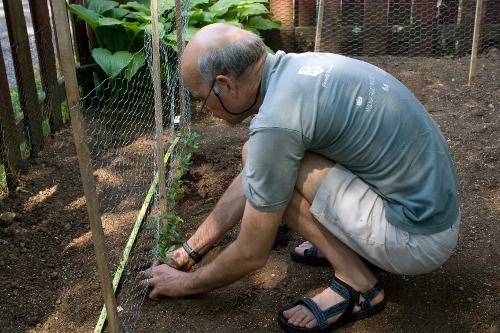 But wait, I'm also planting something that eats carbon dioxide, so I must be contributing to global cooling.
But wait, I'm also planting something that eats carbon dioxide, so I must be contributing to global cooling.
Other than that, I had no idea what I was doing. I'm supposed to be planting peas. But I think it's the wrong time of year. Never grew peas before. This year will probably be no exception.
When it comes to gardening, I am close to clueless. But being clueless has never stopped me before, so why now?
And here I am, shamelessly generating carbon monoxide, plus a lot of noise and dust. More global warming. Somebody needs to report me to the EPA.

And here are my little friends, happily eating the noxious effluents I have shamelessly produced. The tomato in the lower right looks like he's had a little too much CO2.

It's been a good, hard-working, holiday. Doris and I strategized, discussed, planned, drew diagrams, measured, borrowed a rototiller, then went to Lowes. And pitched our plans in the trash. Just too many beautiful plants. Felt like Adam and Eve, prior to the serpent.

We got started after church on Sunday, and worked pretty much straight through today (Tuesday). Here's the vegetable garden. The line with no mulch is where my lettuce is supposed to come up. Never grew lettuce before. This year's probably no exception. At least the seeds were cheap, unlike the peas.

All snide remarks aside, it's been a great holiday weekend. We got a lot done. Here's the pond area. By the way, you can barely see it, but if you'll note the grill in the background, just above it is some black and yellow. It's the bottom of Doris's Iowa Hawkeyes flag. Football Momma loves her Hawkeyes. We're flying it in the backyard so the local OSU fans don't run us out of town.

This is the view from the deck. Comical to watch the birds mug one another in an effort to gain control of the birdbath, which is the prime real estate in the backyard according to my local feathered friends. Whoever talks about nature being in harmony has evidently spent most of their days inside. It's aerial combat out here.

And here's Dor. She's the one who really knows what to do with all these plants.

And this is Lilly, my heart-throb. Gorgeous.



What are these? I already told you, carbon-eating units. I have no idea beyond that, except the near one is an Asian lilly. That I do know. We have diversity quotas for our garden.
That's me, shamelessly contributing to global warming, generating carbon dioxide. By breathing.
 But wait, I'm also planting something that eats carbon dioxide, so I must be contributing to global cooling.
But wait, I'm also planting something that eats carbon dioxide, so I must be contributing to global cooling.Other than that, I had no idea what I was doing. I'm supposed to be planting peas. But I think it's the wrong time of year. Never grew peas before. This year will probably be no exception.
When it comes to gardening, I am close to clueless. But being clueless has never stopped me before, so why now?
And here I am, shamelessly generating carbon monoxide, plus a lot of noise and dust. More global warming. Somebody needs to report me to the EPA.

And here are my little friends, happily eating the noxious effluents I have shamelessly produced. The tomato in the lower right looks like he's had a little too much CO2.

It's been a good, hard-working, holiday. Doris and I strategized, discussed, planned, drew diagrams, measured, borrowed a rototiller, then went to Lowes. And pitched our plans in the trash. Just too many beautiful plants. Felt like Adam and Eve, prior to the serpent.

We got started after church on Sunday, and worked pretty much straight through today (Tuesday). Here's the vegetable garden. The line with no mulch is where my lettuce is supposed to come up. Never grew lettuce before. This year's probably no exception. At least the seeds were cheap, unlike the peas.

All snide remarks aside, it's been a great holiday weekend. We got a lot done. Here's the pond area. By the way, you can barely see it, but if you'll note the grill in the background, just above it is some black and yellow. It's the bottom of Doris's Iowa Hawkeyes flag. Football Momma loves her Hawkeyes. We're flying it in the backyard so the local OSU fans don't run us out of town.

This is the view from the deck. Comical to watch the birds mug one another in an effort to gain control of the birdbath, which is the prime real estate in the backyard according to my local feathered friends. Whoever talks about nature being in harmony has evidently spent most of their days inside. It's aerial combat out here.

And here's Dor. She's the one who really knows what to do with all these plants.

And this is Lilly, my heart-throb. Gorgeous.

Published on May 29, 2012 18:34
May 12, 2012
Book Review: Evangelism and the Sovereignty of God
Packer, J. I. Evangelism and the Sovereignty of God . Downers Grove: Intervarsity Press, 2008 reprint.
To have published a single literary work that becomes a classic is a notable accomplishment. Publishing two gives the writer a corner on contemporary Christians’ reading lists. James Inverness Packer has accomplished just that. Packer is well-known for his landmark book, Knowing God , which first was published in 1973. This is not a review of that book, but if you have not read it you should. Evangelism and the Sovereignty of God (first published, 1961) is the other classic Packer has written, and it punches far above its weight (my copy is a 2008 reprint edition—it’s only 134 pages) in the world of biblically faithful Christian classics.
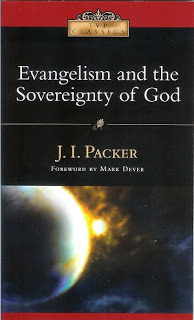
The first chapter, Divine Sovereignty, makes the case that all believers adhere to a confidence in God’s absolute sovereignty. Packer calls the average Christian’s prayer life to the witness stand, and the testimony is irrefutable. If you are inclined to question this last sentence, just read the chapter and form your own opinion: it’s only seven pages long.
Next, in Divine Sovereignty and Human Responsibility, Packer shows that these two poles of activity (divine and human) comprise not a paradox, but an antinomy: the assertion of two statements which seem to be contradictory, but both of which are logically necessary: “An antinomy exists when a pair of principles stand side by side, seemingly irreconcilable, yet both undeniable” [26]. Packer goes on to show, with plenty of examples, that both divine sovereignty and human responsibility are taught in Scripture. His advice regarding how to handle the conflict between the two is wise:
What should one do, then, with an antinomy? Accept it for what it is, and learn to live with it. Refuse to regard the apparent inconsistency as real; put down the semblance of contradiction to the deficiency of your own understanding; think of the two principles not as rival alternatives but, in some way that at present you do not grasp, complementary to each other. Be careful, therefore, not to set them at loggerheads, nor to make deductions from either that would cut across the other (such deductions would, for that very reason, be certainly unsound) [28-29].In his chapter entitled, Evangelism, Packer answers four questions in the light of the foregoing. “What is evangelism? What is the evangelistic message? What is the motive for evangelizing? By what means and methods should evangelism be practiced” [45]? The bulk of the book is found in this chapter, and it is excellent. Packer fully delivers on the promise to deal with the questions, and in doing so he faithfully and powerfully represents the biblical gospel.
The final chapter, Divine Sovereignty and Evangelism, demonstrates that, far from being a damper on our evangelism, a good understanding of God’s sovereign role stokes the flames of our passion to tell the message. God’s sovereignty is, in fact, a guarantee of our success in evangelism.
Without being disrespectful or polemical, Packer has dismantled the typical Arminian concerns regarding the doctrines of grace, as regards evangelism. This book is not a “gotcha!” to be used to win a debate; rather, it is a powerful, positive, pastoral accounting of what must remain a divine mystery: God’s absolute sovereignty, and our undeniable responsibility to evangelize.
Published on May 12, 2012 10:08
May 3, 2012
Please report broken links
I have deleted my account on Scribd (trying to simplify life!), and transferred the files over to my own domain. As a consequence, some of my earlier posts may have broken links. I think I have repaired them all, but it is always possible that I have missed some.
Please email me (chcobb at chcobb.com; replace the at with an @, and no spaces) if you find a broken link.
Thanks!
Please email me (chcobb at chcobb.com; replace the at with an @, and no spaces) if you find a broken link.
Thanks!
Published on May 03, 2012 18:27
May 1, 2012
Book Review: Classic Christianity
George, Bob. Classic Christianity: Life’s Too Short to Miss the Real Thing. Eugene, OR: Harvest House Publishers, 1989
 This is a good book. It has some negatives that I’ll get to in a moment, but there is so much right about the book that the mature, discerning reader can easily overlook the weaknesses and benefit from the strengths. In a nutshell, Classic is about finding one’s identity in Christ, or even more specifically, through one’s union with Christ. George’s big idea is that, having been saved by Christ, I am now properly understood as: totally forgiven, clothed in the perfect righteousness of Christ, an adopted, accepted, and much loved child of God. That is now my identity. It is an identity that is not connected to performance, but is rather connected to the union with Christ I enjoy as a consequence of the ministry of the Holy Spirit.
This is a good book. It has some negatives that I’ll get to in a moment, but there is so much right about the book that the mature, discerning reader can easily overlook the weaknesses and benefit from the strengths. In a nutshell, Classic is about finding one’s identity in Christ, or even more specifically, through one’s union with Christ. George’s big idea is that, having been saved by Christ, I am now properly understood as: totally forgiven, clothed in the perfect righteousness of Christ, an adopted, accepted, and much loved child of God. That is now my identity. It is an identity that is not connected to performance, but is rather connected to the union with Christ I enjoy as a consequence of the ministry of the Holy Spirit.George has one guiding principle as a counselor that appears repeatedly in the book: John 8:31-32 (NIV) . . . “If you hold to my teaching, you are really my disciples. Then you will know the truth, and the truth will set you free.” When he encounters someone with a problem in the course of his counseling ministry, his typical response is to “identify the error” in that person’s thinking, and to dispel it with the Word of God. While there are some weaknesses with this approach, there is also much to commend it.
Strengths of the book include developing and applying the truths of our union with Christ and of the sufficiency of Christ’s sacrifice on the believer’s behalf. George has these things right, and knows how to teach them in such a way so as to bring clarity to the believer. Another strength of this book is its illustrations. George is a master at using illustration to clarify and explain spiritual principles; for this reason the book is an easy read for anyone with a high-school education.
George also gets the whole self-image thing right. It is refreshing to read a popular-level writer who does not teach a man-centered view of self-image. George rightly argues that we don’t need a “good self-image,” rather, we need a “proper, biblical self-image.” George also teaches a thoroughly biblical view of the Mosaic Law: it was never intended as a tool of redemption, but rather as a tool to lead us to Christ.
The book does have its weaknesses, too. All of them I would put under the category of being somewhat imprecise in certain areas of systematic theology, and even a few in the area of practical theology. His definition of reconciliation (p. 70) is, in my view, inaccurate. He believes that the sacrifice of Christ reconciled all people to God, and now there is one sin and one sin only that will send folks to eternal judgment: the sin of unbelief. Beyond the particular redemption/unlimited atonement debate, George is in the odd position of claiming that an unregenerate man is reconciled to God, but will be condemned on the basis of his unbelief alone. While there are many problems with such a construct, it ignores (or at least, truncates) Romans 1 and 2, along with many other Scriptures.
George’s principle of “find the error and dispel it with truth” treats man as though all sin is rooted in the intellect, apart from the will. George’s entire handling of sins that the believer commits, and which contribute to his woes, is inadequate. He really does not get into how sin interferes with our fellowship with God. In some ways, his treatment of sin is very heavily weighted toward the forensic aspect (paid in full by Christ), without delving into the experiential aspect (the misery that sin causes even to a believer). This, to me, may be the major oversight of the book.
There are other small issues, but I do not think it would be wise to accentuate them. This book has gotten some major, really big issues right, and it has done so in a readable and winsome way. The practical truths it presents combined with George’s excellent illustrations will be very helpful to a believer locked into a performance mentality. A good, discerning mentor will be able to correct the reader with the minor issues as necessary.
Published on May 01, 2012 14:48
April 25, 2012
Immanuel
We know this name! We refer to it at Christmas time; it’s one of the names of Jesus. Matthew makes sure that we non-Hebrew speakers know what it means: “God with us” (Matt 1:23).
Was doing some Bible reading this morning, was in the book of Isaiah. What a great book! Finally understood an odd verse for the first time. In chapter seven, during the days of evil king Ahaz, Judah was invaded from the north by a coalition army made up of Israel (aka, Ephraim, or the Northern Kingdom) and Syria (also known as the Arameans).
The year was 734 BC. There was a fresh, growing power in the north: Assyria. The Assyrian king, Tiglath-pileser, was consolidating his power and doing battle with his opponents to his east, in Urartu. The small kingdoms to Tiglath-pileser’s south, Syria (capital: Damascus, king: Rezin) and Israel (also known as Ephraim, capital: Samaria, king: Pekah) saw this as a good time to form an anti-Assyrian military coalition. They courted Judah (capital: Jerusalem, king: Ahaz), seeking an alliance. When Judah refused, Syria and Israel decided they could not afford to have a possible pro-Assyrian opponent to their rear, and so assaulted Judah with the intent of setting up their own puppet king, Tabeel, on the throne of Jerusalem.
To make matters worse, the Philistines to the west, and Edom, to the southeast, chose just this time to make trouble for Judah as well, with the result that the tiny mountain kingdom was now involved in a hot war on three sides.
Which brings us to Isaiah chapter seven. Reports of the advancing coalition army to the north are brought to king Ahaz and he is scared to death, along with all Judah (7:2). Isaiah is told to meet the frightened king and to encourage him. He is to acknowledge the gravity of the situation, including the intent of the aggressors to depose Ahaz (7:3-6). And then he is to give this message:
thus says the Lord God, “It shall not stand nor shall it come to pass. For the head of Aram is Damascus and the head of Damascus is Rezin . . . , and the head of Ephraim is Samaria and the head of Samaria is the son of Remaliah. If you will not believe, you surely shall not last.” Isaiah 7:7-9 (NASB)
Sounds strange to our ears, does it not? The last sentence we get, because it has to do with faith and we understand faith, as believers in Christ. But, “the head of Aram is Damascus, and the head of Damascus is Rezin.” What’s that all about? And “the head of Ephraim is Samaria, and the head of Samariah is the son of Remaliah [aka, Pekah].” How is that comforting, or encouraging?
Isaiah invites Ahaz to ask for a sign of God’s faithfulness. Ahaz refuses, but Isaiah gives him a sign anyway.
“Therefore the Lord Himself will give you a sign: Behold, a virgin will be with child and bear a son, and she will call His name Immanuel. He will eat curds and honey at the time He knows enough to refuse evil and choose good. For before the boy will know enough to refuse evil and choose good, the land whose two kings you dread will be forsaken.” Isaiah 7:14-16 (NASB)
What is the sign? It is that a young woman, a virgin, will bring forth a child who will be named Immanuel. By the time the boy is old enough to begin distinguishing between right and wrong, the nations behind the invading coalition army will themselves have been destroyed.
Now we are in the position to understand both the odd comfort of 7:8-9 and that of verse 14.
Think! What is the capital of the Aramean army? Damascus. Who rules Damascus, thus providing help and sustenance to the Arameans? Rezin.
What is the capital of the Ephraimite army? Samaria. Who rules Samaria, thus providing help and sustenance to the Ephraimite army? Pekah, the son of Remaliah.
Or to put it another way, who is with Aram? Who is with Ephraim?
Are you seeing it yet?
Who is withJudah? The name of the child is the answer, and comprises the message of comfort for Ahaz: Immanuel, God with us, or as the margin of the NASB puts it, God is with us !
Why is this promise so secure and so powerful? Because Judah is the remnant through whom God’s covenant promise of a Davidic Kingdom will be fulfilled. Which is what makes the occurence of the phrase, “house of David” so interesting. It occurs but three times in the entire book of Isaiah. Two of those occurences are here, in Isaiah 7: once in verse 2 in which the bad news of the invasion is announced, and once in verse 13 in which the promise of deliverance is proclaimed. The promise is secure because God’s covenant with David is secure, and Ahaz belongs to the house of David.
Which is also what makes Isaiah’s child’s name so interesting: Shear-jashub (7:3) means a remnant shall return. God will always preserve His remnant. Isaiah is instructed to take that child with him to the meeting with Ahaz, as a reminder to the beleagured king.
True to God’s promise, Aram and Ephraim are destroyed within a very few years and the Assyrians are the destructive instruments in God’s hands. Unfortunately, Ahaz choses not to believe, and both Judah and he pay dearly for the king’s unbelief.
There’s much more here, but that’s enough for now.
Isaiah 7:14 is not only a Messianic announcement; it’s an announcement with a context, a context that helps us understand the Messiah . When death reigned through sin, God sent Immanuel, who accomplished the impossible and defeated sin and death and delivered us by His sacrifice on the cross, and His resurrection to life.
And again, when surrounded by overwhelming odds and certain defeat, when the Christian is in danger of being overrun by fear, tragedy, suffering, failure, death, there is that name, that reminder: Immanuel, God with us .
Published on April 25, 2012 11:04
April 22, 2012
Remembering Dad
My dad died a little over a year ago. April 15th was his birthday; never had a problem remembering his birthday, it fell on tax day every year.
Dad and Lou and I made a habit of getting together once a year when dad started getting a little older. We wanted to have fun together, and add to our collection of shared experiences. Boy, do we have some good memories.
Well, true confessions. Dad had to get both his knees replaced. We blew 'em out in Colorado. Hadn't planned on it, but that's what happened. If you're gonna blow your knees out, do it in Colorado - no better place for it.
Anyway, it was the summer of 1990. I met Dad and Lou at Stapleton International Airport (it was still Stapleton back then) with all their backpack gear. We rented a car, drove to a little flea-bag motel in Glenwood Springs, planning to hit the trail the next day.
"What's that?" I said, pointing to a coffee pot sitting in Lou's stuff on the bed in the motel. We had all our gear out, loading up the packs. Dad never knew it, but Lou and I managed to keep most of the weight out of Dad's pack. After all, he was 67 years old; Lou and I were just a couple of young bucks.
"It's a coffee pot," Lou said, emphasizing it like, duh, can't you see?
"Yeah, and it's not goin'. Too much weight. I've got instant coffee," I replied. I considered myself the backpacking expert, which was a little preposterous, since Lou was the one who taught me how.
"It's goin'."
"No, it's not, Lou. Too much weight!" I insisted.
Lou looked up from his packing, fixed his eyes on mine, and said quietly, "If it doesn't go, I don't go. And not only that, this pound of coffee's going, too. I'm not drinking that stuff," he said, pointing at my little bag of instant. Well, Lou didn't say, 'stuff', he's got a different lexicon, but you got the picture.
I know my big brother. And I knew with that quiet, calm, comment he just made, this was a battle I wasn't going to win. Okay, Lou.
Since we're talking about coffee (how did we get on this subject?), let me say a word about the dive we stayed in that night. They offered continental breakfast. Yeah, right. It amounted to a banana and a cup of coffee, and the serving area was slightly smaller than a phone booth.
Wait, that's an anachronism, isn't it? If you're under thirty, you probably don't even know what a phone booth is. Hmm, what's a similar size? Okay: the serving area had about the same square footage as a porta-potty, and roughly the same appeal.
Anyway, I poured myself a cup of coffee in one of those little styrofoam cups, and when it was full, I could still see down to the bottom of the cup. Think water with a drop of brown food coloring.
We ate at MacDonalds.
So on to the trailhead in the Flattops Wilderness Area. We could not wait to hit the trail.

Dad needed a little help getting mounted up. He was no neophyte. He'd done a great deal of camping, including from horseback. But it took him a bit to get used to his pack.
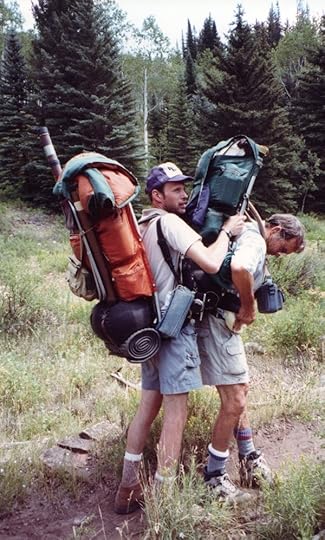
This is my big brother. We were ready for a great trip. He was carrying the coffee pot. And the real coffee. And the sugar.
I had my little ziplock of Instant. Could have saved myself the weight. Never did use that instant coffee. Haven't since. Can't abide by the stuff.
Guess I learned a little bit more about backpacking from Lou: there's some weight that doesn't count--you just bring it. Amen, bro!

We weren't lost. You don't get lost walking up to Marvine Lakes from the trailhead. If you do, you'd better just stay home.

Reminds me of a little story. Was recruiting a group of fathers and sons for a backpack trip. Used to take folks on "backpacking Bible studies" in the Rockies. Anyway, I was giving the group my bona fides, and explaining my experience, how many hundreds of trail miles I had under my boots. Voice from the back of the room piped up, "shoulda been half that; he keeps getting lost!"
Thank you, Dave Linebaugh. Dave should know. Went on every trip I led. Dear brother in Christ. Great friend. Prone to saying embarrassing things about me, though.
Now, where was I? Oh, yeah. We weren't lost. Just having a little, ah, map discussion.
Here's dad. Want to guess what he's saying?

Wait . . . wait . . . are you ready for it?
"Chris, are we almost there yet?"
No, Dad, we've got some streams to cross, and a few miles to go. We wound up camping at a spot halfway to the lakes. Don't want to shoot our whole wad in one day.

Lou and I fixed supper while dad got some fishing in. Interesting role reversal. We told Dad what time to be back, and told him not to be late. We both remembered times camping in New Mexico in the late fifties early sixties when Dad was saying that to us.
Louie wound up having to go hunt him down. He was having too much fun fishing.
We had coffee that night. Real coffee. They were very kind, and shared it with me. You've not had a cup of coffee till you're sitting on a log at 8000 feet elevation, with coyotes crooning down the valley, the air at a snappy 45 degrees, surrounded by the Rocky Mountains and under a sky of diamonds in black velvet, moon rising over a ridge to the east. Oh, my.
Next day we mounted up and resumed our little stroll in the woods.


Have you ever forded a stream fed by snow melt? You've got to be real careful, because when you first step in it, after about a minute in the ice water it feels like someone's clobbering your shins with a club. You endure a few minutes where your legs feel ready to collapse.

Here's what I do. Take your pack off, and put your fording shoes on. Step in the stream and stay put until the pain is too much to bear. Step back out (and if you're smart, you've already picked some nice spot to sit down, because you will sit down, like it or not). Wait until the pain has subsided, then mount up and cross the stream. You'll be fine. If you don't do this, you could wind up going down mid-stream. Then you're going to be really cold. Not to mention wet.

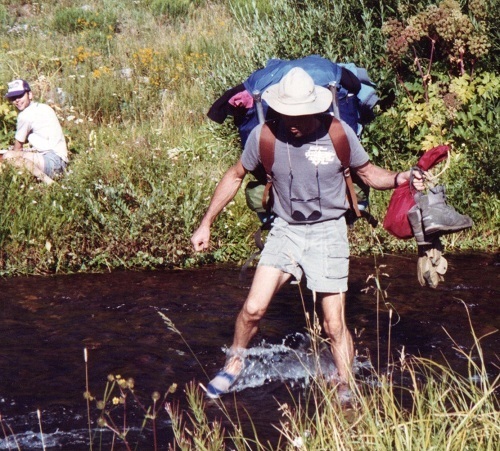

Finally we arrive at the lower end of Marvine lakes. Dad is like a cat watching a bird through a screen window. He's even making some of the same noises. Just can't wait to get a line in the water. Well, brother Lou and I know Dad. If we cut him loose, there are gonna be trout for dinner.
You go fish, dad, we'll set up camp.

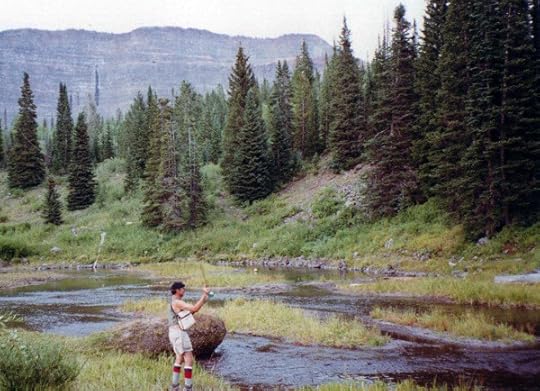
Sure enough. Dad comes back with a limit. He's happy. We're happy. What a special time this is! What a special memory!

When we first arrived there was a horse camp several hundred yards away, but they pulled out, and we had the lakes to ourselves. We've got a very cosy camp.

Dad snores. I mean, like, over the 100 decibel range. I was afraid he'd call a bunch of grizzlies right out of Montana. Come to think of it, I wonder if that's why those horse-campers left? Maybe that's why we had the place to ourselves the rest of the week. Just too much racket at night. Probably spooked the horses.
I don't remember if we drew straws, or my very intelligent brother simply planned it this way. But dad was my tarp-mate. Strong coffee at night with a partner that snores is not a winning formula for a good night's sleep. Not sure if I did get any sleep. Probably by the third night or so, out of sheer exhaustion.


All too soon it was time to go. Okay, it wasn't too soon. We ran out of coffee. And none of us wanted to touch that instant stuff. By the last day or so we were reusing grounds over and over again. Our coffee was starting to look like the Flea-Bag Motel coffee. It was, therefore, time to go. Besides, Dad's got to leave some of these trout for someone else. Wouldn't be right if he caught 'em all.
So, we mount up, our sights on a shower, a massive steak, and a warm bed. And a good cup of coffee. Actually, those were our long term sights. Lou and Dad had hid a beer for themselves in the stream down at the trailhead by the car; I hid a can of pepsi. That's what our immediate thoughts were on. The steak would come later. Later, today, that is.

Was a year later or so that Dad's knees gave out. But he would not have traded that time for the whole wide world.
Love you, Dad. Love you, Lou. I'll never forget that trip. And they never let me forget that coffee!

Published on April 22, 2012 18:46
April 20, 2012
Book Review: Inside the Aquarium: The Making of a Top Soviet Spy
Inside the Aquarium: The Making of aTop Soviet Spy , by Viktor Suvorov
This was a profoundly disturbing book. Suvorov traces his career from his assignment as a lieutenant commanding a company of tanks in the Soviet 13th Army, through being promoted into military intelligence, then being picked for the Spetsnaz, and finally winding up as a GRU spy in the Soviet embassy in Vienna. Along the way he gives us an unparalleled vista of the bankruptcy of the Soviet system.
The view he gives of the GRU is instructive. It was a military intelligence organization that demanded the absolute loyalty and total domination of its secretive minions. The metaphor that most fits is that of selling one’s soul to the devil for your thirty minutes of power and privilege. Suvorov openly admits that he loved the power and privilege he had as a member of the Nomenklatura, of which he was a part by virtue of his association with the GRU. The acquisition and exercise of power were the factors that motivated him, by his own testimony.
In the GRU, every one was being watched and everyone was watching someone else. The lives of the agents were dominated by fear of failure, fear of mistakes, and fear of exposure—but not exposure to the other side so much as exposure to the GRU itself.
Perhaps the most telling example the author provides is of an assignment he was given by a GRU superior to drop a package containing a bible into a fellow GRU agent’s apartment mailbox, an agent known to be Suvorov’s friend. The agent was being tested. His only possible correct response was to immediately report that he’d received a bible in the mail (I can not imagine living under such petty reporting requirements). If he failed to make the report he would be accused of having an interest in religion (subversive indeed!) and would be evacuated from Vienna to the Aquarium, GRU headquarters at Khodinka airfield in Moscow, where he would be executed. While Suvorov was delivering the package he was tempted to warn his friend to make the report. He decided against doing so, realizing that he himself was known to be the man’s friend and was himself also under surveillance. As he made the drop, it dawned on Suvorov that this was as much a test for him as it was for his friend. Would he be loyal to the GRU, even though he would be condemning his friend to death, or would his friendship win out? Suvorov survived; his friend failed to make the requisite report, and was condemned.
It was a group which devoured its own. In such an organization, you quickly learned to trust no one, and to subvert all loves and loyalties to the overriding demands of the GRU. True friendship was impossible; it could get you killed. It was a soulless system, officially and aggressively atheistic, with no moral good other than the good of the State itself, as defined by the corrupt individuals who had happened to claw their way to the top of the mountain of bodies at the moment. “I serve the Soviet Union!” was the obligatory response to any praise or commendation.
I read the book as part of my research for my novel, Falcon Down , in which the GRU plays a significant part. It was a valuable exercise, and I gained much useful information. It is an interesting read, though you want to wash your hands when you put the book down.
One thing the book left me with was a renewed understanding of what the closed Soviet society became, especially for the upper class. The brutality of the Soviet system, combined with an official atheism able to offer no moral constraints, no meaning, and no hopes beyond the personal acquisition of power and privilege, nearly ruined a beautiful country and a vibrant people. Suvorov’s Soviet Union became a real-life Lord of the Flies experience. One can only hope that some day Russia will come into its own as a prosperous, free, and happy country.
Published on April 20, 2012 18:20
April 17, 2012
Book Review: Amazing Grace, by James M. Boice
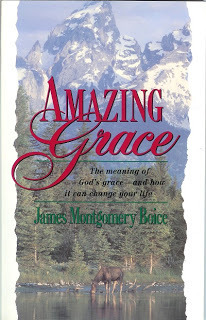 Boice has written a text that very well may become a classic, as Gerstner’s comment on the back cover suggests. The book is written with a near-perfect combination of popular-level scholarship and pastoral voice. Boice delivers on what his title and subtitle promise, as he enters into a comprehensive, but non-technical, study of grace.
Boice has written a text that very well may become a classic, as Gerstner’s comment on the back cover suggests. The book is written with a near-perfect combination of popular-level scholarship and pastoral voice. Boice delivers on what his title and subtitle promise, as he enters into a comprehensive, but non-technical, study of grace.The topic is dealt with in four parts. Part One deals with Our Gracious God. Starting with God’s actions toward Adam and Eve at the time of the Fall, the author demonstrates that there was grace expressed in Eden. He then moves on to discuss the vital issue of Common grace (theologians’ explanation for God’s goodness as it is experienced by all people), and then wraps up the section by speaking of the grace that was revealed in the life and ministry of Jesus Christ.
In Part Two, Saving Grace, Boice sets the table by beginning with an exposition of Ephesians, in which he demonstrates that God’s saving grace proceeds from God’s sovereign choice in election. This is followed by a chapter (again using Ephesians) asserting that salvation is by grace alone, followed by the next chapter which attests that justification is by grace alone. Boice does an excellent job explaining the terminology, such that this book could be given to a seeker who is largely unfamiliar with the intellectual territory of salvation.
Moving along to chapter seven, we are shown the effects of God’s grace in our daily lives (the title is, aptly, Standing in Grace). Boice uses this chapter to deal with the all-important subject of our union with Christ, as well as the vital topic of suffering. Many Christians are confused about the issue of our security in Christ, and the author handles that matter in chapter eight. Part Two wraps up with a discussion of the abundance of God’s grace and the relationship of law and grace.
So far, the book has operated somewhat on a chronology of a spiritual journey. The first part dealt with the awakening to sin, and the awakening to Christ. The second with matters pertinent to becoming a true believer in Christ. In keeping with this pattern, the third part (Living by Grace)deals with issues for a new Christian.
Chapter eleven covers growing strong in grace, and twelve the sufficiency of grace to cover our weaknesses. Boice then moves on to the role of grace in prayer, giving, and our communications in succeeding chapters.
The final part of the book (Grace Triumphant) is given to the matter of perseverance, and the Bible’s benedictions of grace.
One of the strengths of this marvelous exposition of grace is the wide range of audiences for whom it will be helpful. Christians of any spiritual age will benefit from the results of Boice’s careful study. Individual chapters of the book can be profitably employed by biblical counselors seeking to build up one portion or another of a counselee’s life. The book can also be given to those who are not yet in Christ, as the first two parts comprise a compelling, lucid explanation of the gospel.
This is an excellent book written at an accessible, popular level, and I recommend it highly. You may have a little difficulty securing a copy; at the moment (April, 2012) it seems to be out-of-print, which is a real shame considering its value. You can find used copies on the Internet, however, for a good price.
Published on April 17, 2012 09:39
April 7, 2012
Pictures from the book-signing
On March 24, I had my very first book-signing at Bread of Life bookstore, here in Greenville, Ohio.
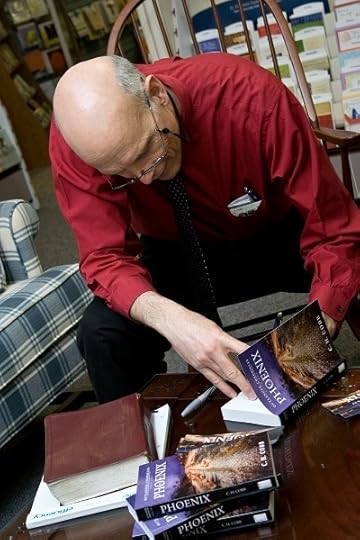
I had no idea what to expect. Because I am a complete unknown (outside the fact that the folks who go to my church know me) I had visions of no one showing up, sort of like the scene in National Treasure II when Riley is sitting alone at his book-signing and the passersby are ignoring him.
Then I found out my crew was coming, Doris, Dani, and Lauri, and Luke and Rori, so I figured it would not be so bad.

Then folks from the church began to show up (thank you, BFCers!). Dani is shooting this pix, and Doris is watching the grandkids in the children's play area, which is why you don't see them here. The bookstore owner, Don Smearsoll is at the lower right. Thanks, Don and Susan, for making the Cobb clan comfortable and welcome, and for the publicity and all the little extras to make this a success!
Rich came by, and had me sign his Kindle. Couldn't believe it. That was a first!
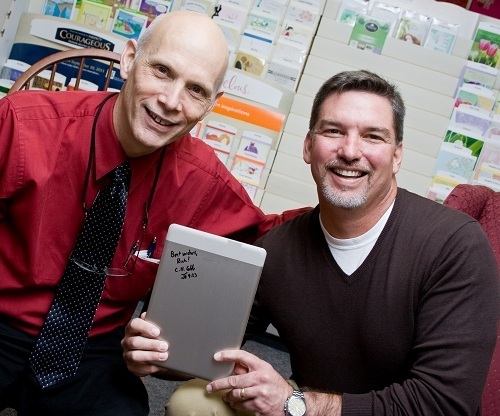
Thank you to all who came, and to all who bought books (we sold seventeen!).

Brad was there! (Click the picture to see a larger version)

Grace, Elijah, and Beth came.

Steve bought a copy for a friend.
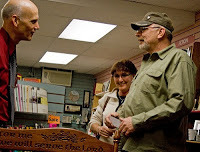
Rick and Cheryl, and others, were there as well.
A real big thanks to Doris, who has not only endured my foolishness, but constantly encourages me in my writing, even though it eats up large chunks of the time I have at home.



I had no idea what to expect. Because I am a complete unknown (outside the fact that the folks who go to my church know me) I had visions of no one showing up, sort of like the scene in National Treasure II when Riley is sitting alone at his book-signing and the passersby are ignoring him.
Then I found out my crew was coming, Doris, Dani, and Lauri, and Luke and Rori, so I figured it would not be so bad.

Then folks from the church began to show up (thank you, BFCers!). Dani is shooting this pix, and Doris is watching the grandkids in the children's play area, which is why you don't see them here. The bookstore owner, Don Smearsoll is at the lower right. Thanks, Don and Susan, for making the Cobb clan comfortable and welcome, and for the publicity and all the little extras to make this a success!
Rich came by, and had me sign his Kindle. Couldn't believe it. That was a first!

Thank you to all who came, and to all who bought books (we sold seventeen!).

Brad was there! (Click the picture to see a larger version)

Grace, Elijah, and Beth came.

Steve bought a copy for a friend.

Rick and Cheryl, and others, were there as well.
A real big thanks to Doris, who has not only endured my foolishness, but constantly encourages me in my writing, even though it eats up large chunks of the time I have at home.

Published on April 07, 2012 17:18



